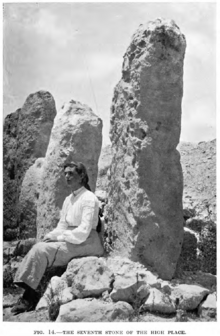Matzevah or masseba[1] (Hebrew: מַצֵּבָה maṣṣēḇā; "pillar") is a term used in the Hebrew Bible for a sacred pillar, a type of standing stone. The term has been adopted by archaeologists for Israelite and related contexts, such as the Canaanite and the Nabataean ones. Massebot can also mark graves.

Etymology
editThe Hebrew word matzevah is derived from a root meaning 'to stand', which led to the meaning of 'pillar'.[2]
In transcription, many spellings are possible.[3]
Biblical narrative
editUse of the exclusive word[clarification needed] can be found in Genesis 28:18, 28:22, 31:13, 31:45, 35:14, 35:20, Exodus 24:4, Deuteronomy 16:22 and Hosea 3:4.
Jacob
editJacob set up four massebot in the canon.
- Bethel
- Mitzpah (והמצפה) (w-h-mtzfh)
- Bethel (again)
- Rachel's grave
In Genesis 28:22, Jacob says "and this stone, which I have set up for a matzevah, shall be God's house" and in Genesis 31:13 Yahweh says to Jacob "I am the God of Bethel [lit. "House of God"] where you anointed a matzevah and made a vow to me...".
"Jacob set a pillar upon her grave: that is the pillar of Rachel's grave unto this day." (Genesis 35:20) It could also stand as a witness: upon confronting Jacob in Gilead, Laban declared "This rock-pile is a witness, and this matzevah is a witness, that I will not pass this rock-pile, and you will not pass this rock-pile and this matzevah for evil." (Genesis 31:52)
See also
edit- Asherah pole, Canaanite object honouring Asherah
- Baetylus, a type of sacred stone
- Bema and bamah ("High place",) elevated platform
- Ceremonial pole
- Lingam, abstract representation of the Hindu god Shiva
- Menhir, orthostat, or standing stone: upright stone, typically from the Bronze Age
- Stele, stone or wooden slab erected as a monument
References
edit- ^ Oxford Biblical Studies Online, Oxford University Press. Accessed 14 February 2022.
- ^ Tombstone. Oxford University Press. 1999. ISBN 9780192800886. Retrieved 17 January 2022 – via oxfordreference.com.
{{cite book}}:|work=ignored (help) - ^ The Monument ("Matzeivah"), Maurice Lamm for Chabad.org. Accessed 17 Jan 2022.
External links
edit- "matzeva" at Encyclopædia Britannica online